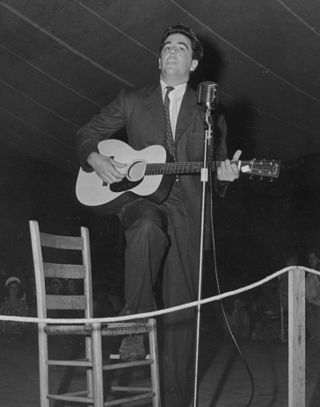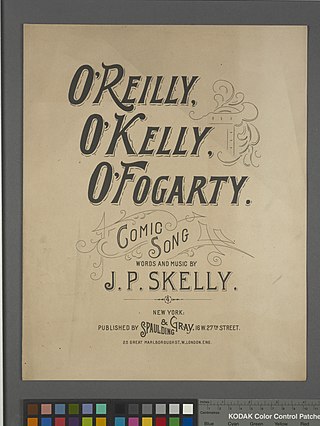Related Research Articles

Alan Lomax was an American ethnomusicologist, best known for his numerous field recordings of folk music of the 20th century. He was a musician, folklorist, archivist, writer, scholar, political activist, oral historian, and film-maker. Lomax produced recordings, concerts, and radio shows in the US and in England, which played an important role in preserving folk music traditions in both countries, and helped start both the American and British folk revivals of the 1940s, 1950s, and early 1960s. He collected material first with his father, folklorist and collector John Lomax, and later alone and with others, Lomax recorded thousands of songs and interviews for the Archive of American Folk Song, of which he was the director, at the Library of Congress on aluminum and acetate discs.

John Avery Lomax was an American teacher, a pioneering musicologist, and a folklorist who did much for the preservation of American folk music. He was the father of Alan Lomax, John Lomax Jr. and Bess Lomax Hawes, also distinguished collectors of folk music.

"Barbara Allen" is a traditional folk song that is popular throughout the English-speaking world and beyond. It tells of how the eponymous character denies a dying man's love, then dies of grief soon after his untimely death.
Alan Jabbour was an American musician and folklorist, and the founding director of the American Folklife Center at the Library of Congress.
The Roud Folk Song Index is a database of around 250,000 references to nearly 25,000 songs collected from oral tradition in the English language from all over the world. It is compiled by Steve Roud. Roud's Index is a combination of the Broadside Index and a "field-recording index" compiled by Roud. It subsumes all the previous printed sources known to Francis James Child and includes recordings from 1900 to 1975. Until early 2006, the index was available by a CD subscription; now it can be found online on the Vaughan Williams Memorial Library website, maintained by the English Folk Dance and Song Society (EFDSS). A partial list is also available at List of folk songs by Roud number.

Mary Helen Creighton, CM was a prominent Canadian folklorist. She collected over 4,000 traditional songs, stories, and beliefs in a career that spanned several decades, and she published many books and articles on Nova Scotia folk songs and folklore. She received numerous honorary degrees for her work and was made a Member of the Order of Canada in 1976.
"Wee Cooper O'Fife" is a Scottish folk song about a cooper who has "a braw new wife" who will not cook, clean, and sew in case she "spoil her comely hue". The title of the song is also a pun that plays on the name of Cupar, a town in Fife.
"Mary Don't You Weep" is a Spiritual that originates from before the American Civil War. As such, scholars sometimes refer to it as a "slave song", "a label that describes their origins among the enslaved", and it contains "coded messages of hope and resistance". It is considered one of the most important Negro spirituals. It is listed as number 11823 in the Roud Folk Song Index.
Peter Douglas Kennedy was an influential English folklorist and folk song collector throughout the 1950s, 1960s and 1970s.
Phil Tanner was a traditional singer from Llangenith in the Gower Peninsula.
James P. Leary is a folklorist and scholar of Scandinavian studies, and a professor at the University of Wisconsin–Madison.
The Byron Arnold collection is an archival collection of Alabama folksong recordings and transcriptions, held at the University of Alabama. The collection was used to publish a 1950 book, Folksongs of Alabama, and later reused for the 2004 Alabama songbook. Several albums have also been published from the collection.

Ruby Pickens Tartt was an American folklorist, writer, and painter who is known for her work helping to preserve Southern black culture by collecting the life histories, stories, lore, and songs of former slaves for the Works Progress Administration and the Library of Congress. In 1980 she was inducted into the Alabama Women's Hall of Fame.

Eloise Hubbard Linscott was a 20th-century American folklorist, song collector, and preservationist. She is the author of Folk Songs of Old New England (1939), considered a valuable scholarly source for American folk songs. John Lee Brooks described Folk Songs of Old New England as an American equivalent of Bishop Percy's 1765 work Reliques of Ancient English Poetry.

"Coon, Coon, Coon" is a "coon song" from 1900. The words were written by Gene Jefferson and the music by Leo Friedman. The lyrics are about an African American concerned with his appearance including his skin color and hair type while not being accepted by a woman. He makes efforts to acquire Caucasian characteristics but fails and is called out. Songsheet cover for the music include caricatured African American faces and a photograph of minstrel performers of the song inset.

Joseph Natus was an American minstrel performer and recording artist who was prominent during the early 20th century. He was a tenor.

Joseph Paul Skelly, also abbreviated J. P. Skelley, was a composer of music. He arranged the music for songs published as sheet music. For other songs he composed the words and music. The Lester S. Levy Sheet Music Collection at Johns Hopkins University has sheet music for many of the songs he composed. The Library of Congress has several of his works in its collection.

Mary Celestia Parler was a folklorist and professor at the University of Arkansas. She and her husband Vance Randolph recorded folk music in Northern Arkansas from the 1930s until the 1960s. They also established the Arkansas Folklore Society in 1950. It lasted until 1960. Folklorist Rachel Reynolds wrote a chapter about her in Arkansas Women: Their Lives and Times.
Artus Moser (1894–1992) was an American folklorist, educator and musician who collected hundreds of folk songs in his native Western North Carolina and the Appalachian Mountains.
Leonard Finseth (1911-1991) was a Norwegian-American fiddler from Mondovi, Wisconsin. He was well known for playing Old-time Norwegian dance music in his community, including waltzes, reels, schottisches, and polkas. He also recorded two albums: The Hills of Old Wisconsin and Scandinavian Old Time: Folk Fiddle from Wisconsin and was included in Scandinavian-American Folk Dance Music Vol. 2 and Across the Fields: Fiddle Tunes and Button Accordion Melodies. Other recordings of his music can be found at the Mills Music Library in Madison, Wisconsin.
References
- 1 2 "My Journey to Folksongs of Another America". 15 December 2014.
- ↑ "Leland A. Coon (1892-1980)". Library of Congress.
- 1 2 3 4 "Wisconsin Folksong Collection – UW Digital Collections".
- 1 2 Cohen, Norm (22 December 2015). Traditional Anglo-American Folk Music: An Annotated Discography of Published Sound Recordings. Routledge. ISBN 9781317333920 – via Google Books.
- ↑ "Michigan History". Michigan Historical Commission. 6 January 1978 – via Google Books.
- ↑ CLEE25. "Folklorist Jim Leary Highlights Wisconsin's Folk Music Tradition".
{{cite web}}: CS1 maint: numeric names: authors list (link) - ↑ Quaife, Milo Milton; Schafer, Joseph; Alexander, Edward Porter (6 January 2019). "Wisconsin Magazine of History". State Historical Society of Wisconsin. – via Google Books.
- ↑ "Charles Dietz and Helene Stratman-Thomas - UWDC - UW-Madison Libraries".